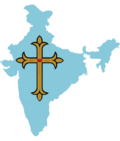|
Joseph Parecattil
Joseph Parecattil (1 April 1912 – 20 February 1987) was an Indian prelate of the Syro Malabar Catholic Church. He served as Archbishop of Ernakulam from 1956 to 1984, and was elevated to the cardinalate in 1969. He was the first Cardinal from Kerala and second from India. BiographyJoseph Parecattil was born in Kidangoor, Kerala, and studied at the minor seminary of Ernakulam and the major seminary of Kandy, from where he obtained a doctorate in theology (with a dissertation entitled: "Augustine vs. Pelagius on Grace").[1] Varghese Payyappilly Palakkappilly was the manager of St. Mary's High School, Alwaye where he had his boarding life. He also attended the University of Madras, where he specialised in economics.[1] Ordained to the priesthood on 24 August 1939,[2] he then did pastoral work in the Archdiocese of Ernakulam, serving as assistant pastor at Narakal and North Paravur and as pastor at Chunangamvely. He was also editor of the weekly Sathyadeepam ("Light of Truth").[1] On 28 October 1953, Parecattil was appointed Auxiliary Bishop of Ernakulam and Titular Bishop of Arethusa dei Siri by Pope Pius XII.[2] He received his episcopal consecration on the following 30 November from Cardinal Eugène Tisserant, with Archbishop Joseph Attipetty and Bishop George Alapatt serving as co-consecrators.[2] After the death of Archbishop Augustine Kandathil on 10 January 1956, Parecattil was promoted to Archbishop of Ernakulam on the following 20 July.[2] He attended the Second Vatican Council from 1962 to 1965, and served as President of the Syro-Malabar Episcopal conference, of the Kerala Catholic Episcopal Conference, and of the Catholic Bishops' Conference of India (1972–1976).[1] Pope Paul VI created him Cardinal Priest of Nostra Signora "Regina Pacis" in the consistory of 30 April 1969.[1] In addition to his duties as archbishop, Parecattil was also President of the Pontifical Commission for the Revision of the Code of Oriental Canon Law from 1972 to 1987.[1] He was one of the cardinal electors who participated in the conclaves of August and October 1978, which elected Popes John Paul I and John Paul II respectively. As a prominent leader of the Catholic Church in Kerala and of Christianity in the state, the Cardinals vision for the welfare of society went beyond just the community from where he came from. His eminent thoughts and prophetic visions led to the founding of a number of Hospitals and educational institutions - Lissie Hospital in Kochi, Little Flower Hospital in Angamaly and Bharata Mata College in Thrikkakara standing tall among them.[3] The Cardinal played a key role in founding Kalabhavan, the cultural arts centre in Kochi.[4] After an 28-year-long tenure as Archbishop of Ernakulam, he resigned as archbishop on 30 January 1984.[2] Parecattil died in Kochi, aged 74. He is buried in St. Mary's Cathedral Basilica in Ernakulam.[1] Justice Bhaskaran Nambiar, a former Judge of the High Court of Kerala once opined “Greatness can be a way of life. Greatness is certainly the will of God. Cardinal Parecattil was great in his lifetime, greater after his death. He lived not merely for the present, but also for the future. He had in him divine grace and that is the legacy he has left to mankind.”[5] In 2012, to commemorate the 100th birth anniversary of the Cardinal, Indian Post released a postal cover.[6] Former Chief Minister of Kerala, Oommen Chandy lauded the late visionary's contributions towards education, healthcare and the overall development of the society at an event.[7] See alsoReferences
|
||||||||||||||||||||||||||||||||||||

